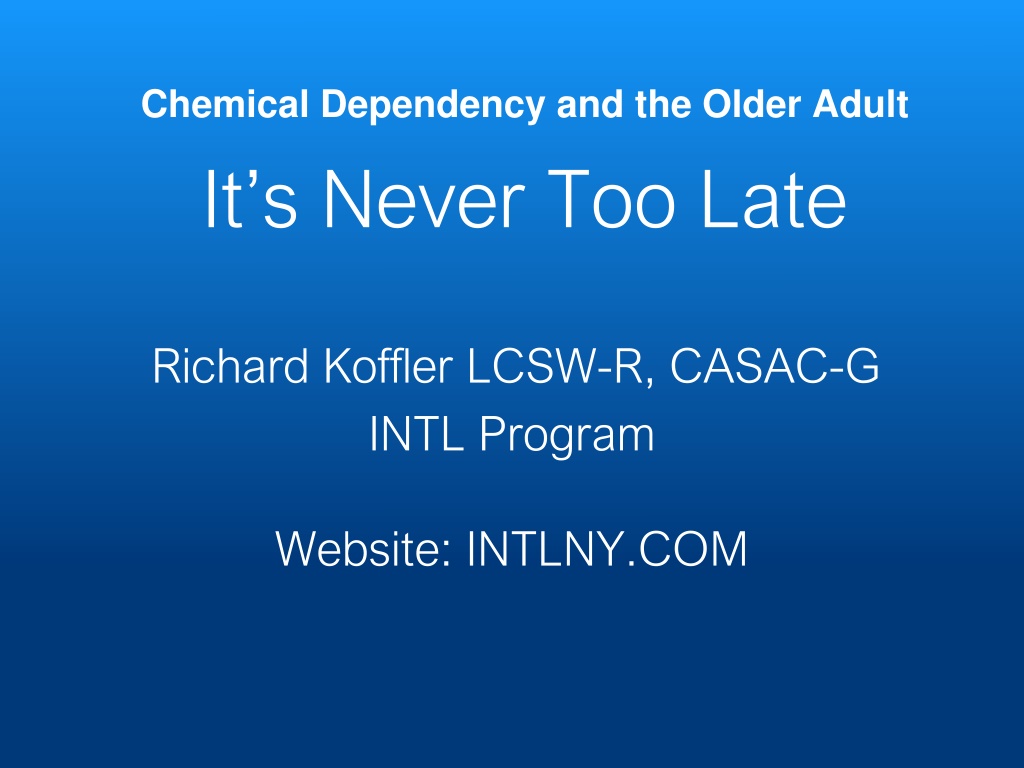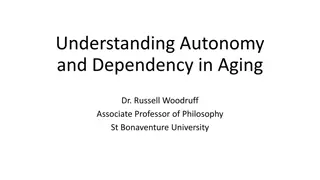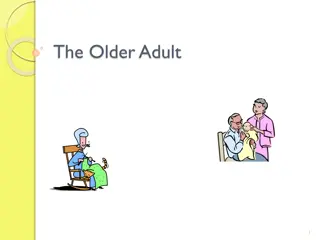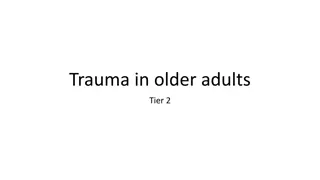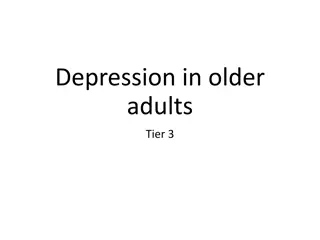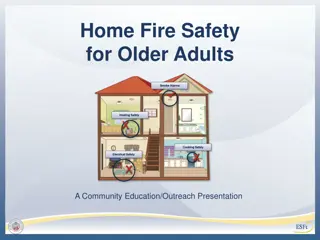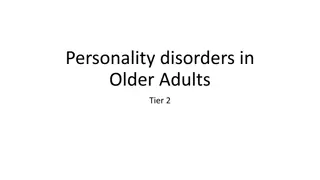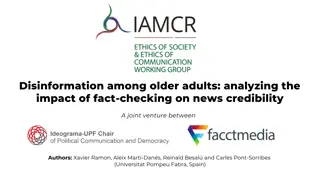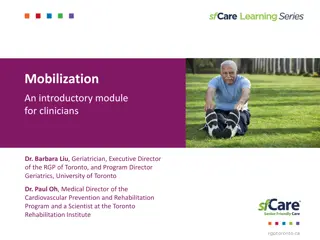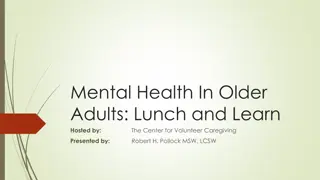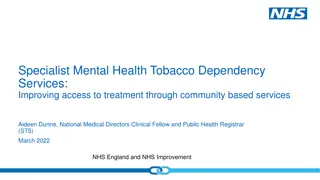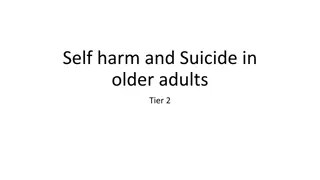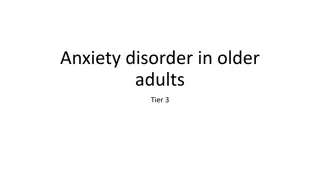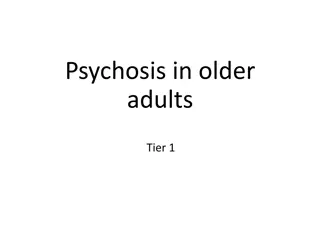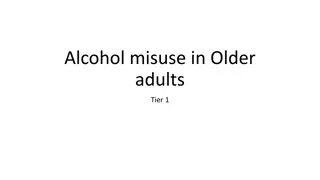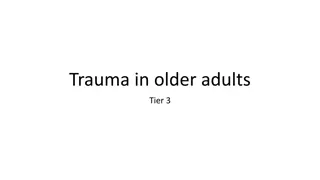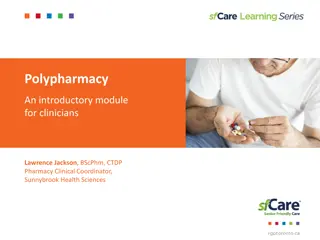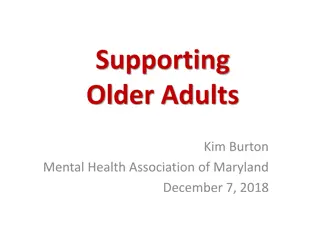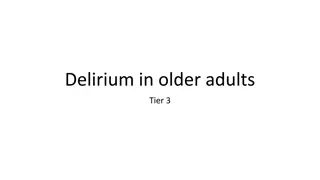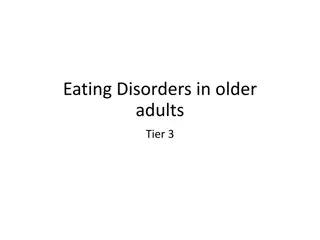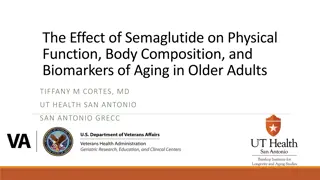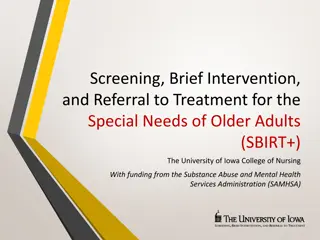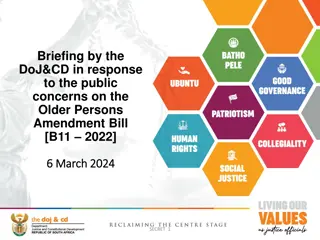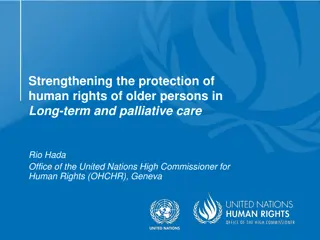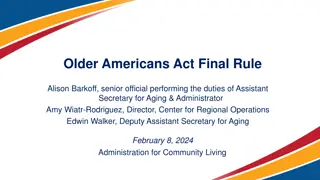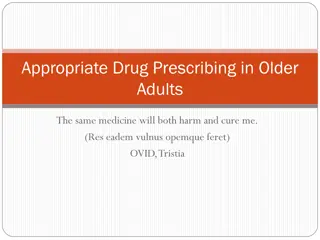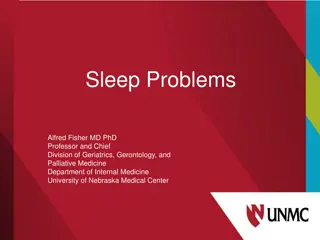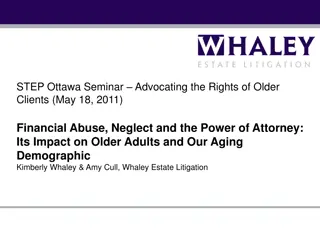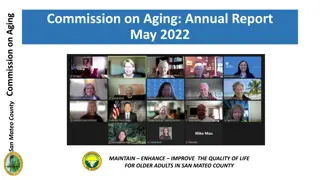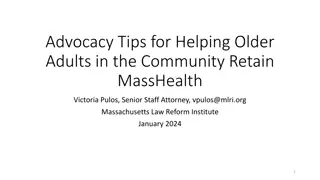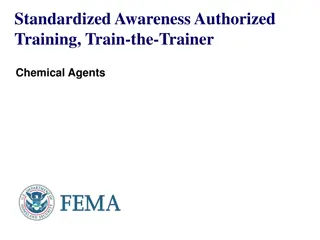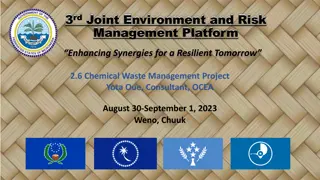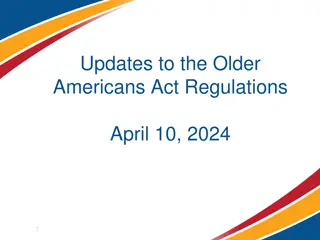Understanding Chemical Dependency in Older Adults
Older adults are increasingly affected by alcohol abuse and addiction. This article emphasizes the prevalence of alcohol use in this demographic, the societal misconceptions, and the medical and psychiatric signs to watch for. It sheds light on the importance of identifying and addressing chemical dependency among older individuals to ensure their well-being and quality of life.
Download Presentation

Please find below an Image/Link to download the presentation.
The content on the website is provided AS IS for your information and personal use only. It may not be sold, licensed, or shared on other websites without obtaining consent from the author. Download presentation by click this link. If you encounter any issues during the download, it is possible that the publisher has removed the file from their server.
E N D
Presentation Transcript
Chemical Dependency and the Older Adult It s Never Too Late Richard Koffler LCSW-R, CASAC-G INTL Program Website: INTLNY.COM
Alcohol Use in Older Adults 10% of Americans abuse alcohol As many as 17% of adults 65 and over have an alcohol abuse problem 14% of women have more than one drink per day 15% of men have more than two drinks per day Retirement communities estimated use - as many as 31% of men and 20% of women have more than 3 drinks per day Retirement communities estimated use-as many as 31% of Hays, L. et al. presented at the Academy of Addiction Psychiatry 2002 Symposium: Substance Abuse Disorders in the Elderly: Prevalence. Special Considerations and Treatment University of Kentucky
Misdiagnosed Chemical Dependency with Older Adults Society s View of Alcoholics and Addicts Homeless Heroin Addicts Bums Drunks YOUNGER PEOPLE Physicians may choose to ignore or more often don t look for the diagnosis of Chemical Dependency or it may be a Transferential Issue
Medical/Psychiatric Signs and Symptoms Unsteady gait - frequent falls - unexplained bruises confusion / memory problems - changes in eating habits missing meals isolation - lack of interest in usual activities and an inability to care for their hygiene. GI problems, Diabetes, Stroke, Liver Disease and Hypertension Forgetting to take medication due to drinking Cross reaction from drinking and taking meds Depression, Anxiety Disorders, PTSD (VV)
Medical/Psychiatric Signs and Symptoms Drinking despite medical admonitions Dehydration Sexual dysfunction Problems with family and/or friends Anxiety and annoyance when asked about alcohol use Insomnia
Societys View of the Older Adult We tend to look at youth/beauty Older adults are: Asexual Unemployable Unintelligent Mentally Incompetent Frail Get sick easily and are close to dying
Ethnicity : INTL 75 African American/Black 60 Caucasian/White 45 Hispanic 30 Asian 15 Other 0 Afro Amer Caucas Hispanic Other
Age of QHC/INTL Clients 60 45 30 15 0 50-55 56-64 65-77 83+
Early vs. Late Onset 2/3 of admission to INTL are Early Onset They tend to drink more than Late Onset They re families are less involved Longer drinking history = Increased legal, social, medical and financial problems
Late Onset Alcohol Dependence 60 and Older Retirement Loss of spouse Friends are no longer around lonely Not with other couples - social withdrawal Appears to be related to the stress of aging Family tend to be involved
Outreach Difficult population to reach Not working - excessive free time Living alone - Family may not be aware Decreased socialization - Neighbors may not be aware
Screening for Chemical Dependency Physicians would benefit from education of the disease of addiction Emergency Rooms-Urgent Care Centers Medical Floors Nursing Homes Clinics VNS
Screening for Chemical Dependency MAST-G Alcohol Screening for Older Adults 1. When talking with others, do you ever underestimate how much you actually drink? 2. After a few drinks, have you sometimes not eaten or been able to skip a meal because you didn t feel hungry? 3. Does having a few drinks help decrease your shakiness or tremors? 4. Does alcohol sometimes make it hard for you to remember parts of the day or night? 5. Do you usually take a drink to relax or calm your nerves?
MAST-G 6. Do you drink to take your mind off your problems? 7. Have you ever increased your drinking after experiencing a loss in your life? 8. Has a doctor or nurse ever said they were worried or concerned about your drinking? 9. Have you ever made rules to manage your drinking? 10.When you feel lonely, does having a drink help? Scoring: If the person answered yes to two or more questions, encourage a talk with the doctor. Source: University of Michigan Alcohol Research Center, Michigan Alcohol Screening Test (MAST-G). C The Regents of the University of Michigan, 1991.
What We Need To Know Transference/Counter Transference Come to terms with all of your family issues Treatment providers beliefs/attitudes Why Stop?? Let them enjoy themselves Improve the quality of life/Regain vision-purpose in their lives Shame-Morality vs. Disease
Assessment Thought process can be slower Extra time is needed for assessment If the client feels rushed Need to develop confidence in the treatment process Aware of the therapist s dress Respect-spoken to like adults-not children - You don t have to speak loudly Mr. or Mrs. Smith-Don t assume that it is appropriate to address them by their first name.
Treatment Age specific groups appear to work best Younger clients have a tendency to rescue older clients - Seen as helpless Older adults want to be with their peers They have wealth of experience-many years of information Change can be slow Graduates are always welcome back to the group
Treatment Non-Confrontational and supportive - Individual sessions 20-30 minutes Groups - Age specific-identify with members closer to their own age Don t want to be around younger people Vocabulary - Don t Understand Drugs-Fear-Even in groups-addicts/alcoholics Younger members could be their children/grandchildren s age *Socialization-Reducing isolation-Activities Therapy*
Groups Groups are the preferred method of treatment for Chemical Dependency Education groups - confront denial Developmental problems associated with aging Groups of course are supportive-oriented toward problem solving Not comfortable discussing problems in front of others - groupwork - although the group may not be focused on me I can relate to the issue. Encourages others to open up - slowly - TRUST
Reminiscence Group An opportunity to review their lives Positive times / events Validated their contributions - Affirms self-worth Letting clients tell their stories is therapeutic for the group Let them bring pictures - Great for activity therapy - Collage
Aging and Addiction Difficulty moving from one stage of life to another Negative affect associated with role transition (anger, fear, grief, anxiety and depression) Inability to view new role as an opportunity for growth and development Inadequate skills to cope with life role transition
Grief and Loss Validate the client s grief Teach them the stages of bereavement Accepting the reality of the loss; experiencing the pain of grief Adjusting to new life circumstances Reinvesting in new life circumstances
Spirituality Higher Power: Many of the INTL clients have a positive view of a Higher Power - Aging appears to impact a belief again - Many clients grew up in families with strong religious beliefs. Pastoral care - Comes to group and addresses concerns about Heaven, Hell, Salvation and Condemnation Shame: Some need to ask if HP will forgive them Some question the painful times in their lives - Loss of a loved one, child, spouse
Socialization Isolated = Senior centers INTL = Arts & Crafts-Has a positive impact on younger clients as well (Activity Group) Important to structure time previously used for drinking/drugs Self-Help = Fellowship-community support = INTL Graduates meet with them
Aftercare Older adults - Mature Adults - Not Geriatric Knowledge of liaisons and advocate agencies Utilities ConEd - Verizon One phone call can mean a lot to a client - Reduce stress - Reduce risk of relapse Meals on Wheels - Senior companions JASPOA, Volunteer at hospital - sense of purpose AARP - Classes they may actually want to take Veterans groups, clubs, organizations
Aftercare How do I get to meetings? I don t want to go out alone at night Follow up with medical/psychiatric care - calendars to track appointments - Pill bottles to keep track of medications Develop supports within the community - INTL grads once again helpful Family treatment - Develop schedule of regular contact between family members Let the client develop their treatment plan fears -concerns - relapse
What does an older adult program need to best serve this population? Case Management Outpatient Treatment Transportation Facilitating AA and Alanon Home Visits Social Functions Communication with professionals Educational Presentations
Alcoholics Anonymous Began in 1935 by two men-Stockbroker and a physician. First AA Group (meeting) formed in 1935. (Akron, Ohio) Group number two in 1937 (NYC). By 1939 there 900 men and women sober in AA after an article was written about AA. In 1940 John D. Rockefeller had a dinner to which AA s were invited to tell their stories. March 1941 Saturday Evening Post article by Jack Alexander By the end of 1941 there were 8,000 members. March 1976 conservatively estimated to have more than 1,000,000 members - 28,000 groups in 90 countries. November 2001 two million members-100,800 in approximately 150 countries. The book has been translated into 43 languages. From the AA 12 Step program there are at least 164 other 12 Step programs.
Recovery Process of Change Continuum of Care Plan Ultimate Goal Sobriety Community Support / Services
Personal Stories BM GG JJ Bobby M Bobby M Vietnam Veteran Vietnam Veteran - - 63 y.o. Detoxes Detoxes - - Rehabs Rehabs - - Legal Problems employment employment - - Crack Cocaine Crack Cocaine Alcohol 63 y.o. Legal Problems - - Loss of Alcohol Pot Loss of Pot GG GG Sandhog Sandhog Man s man Man s man no belief in a Higher Power no belief in a Higher Power Sober at 72 Sober at 72 Died at 75 Died at 75 Were the best three years of his life of his life AA was like a home away from home AA was like a home away from home Were the best three years JJ JJ Every Drug Known to Man Every Drug Known to Man - - 30 years of incarceration Changed name Changed name - - Changed person? Changed person? 30 years of incarceration - -
Patience, Patience, Patience The clients we serve will be us soon Respect Listen - Patience Patience - Patience Be Genuine - They know if we re not We can hope to improve the quality of their lives - Their age does not matter
Theres Never a Second First Impression! People may not remember exactly what you did, or what you said; but, they will always remember how you made them feel
Self Care Is Essential We can be the biggest hypocrites in the world We must take care of ourselves You never want to use this slogan (and I ll take credit for it)
Take My Advice I m not using it
